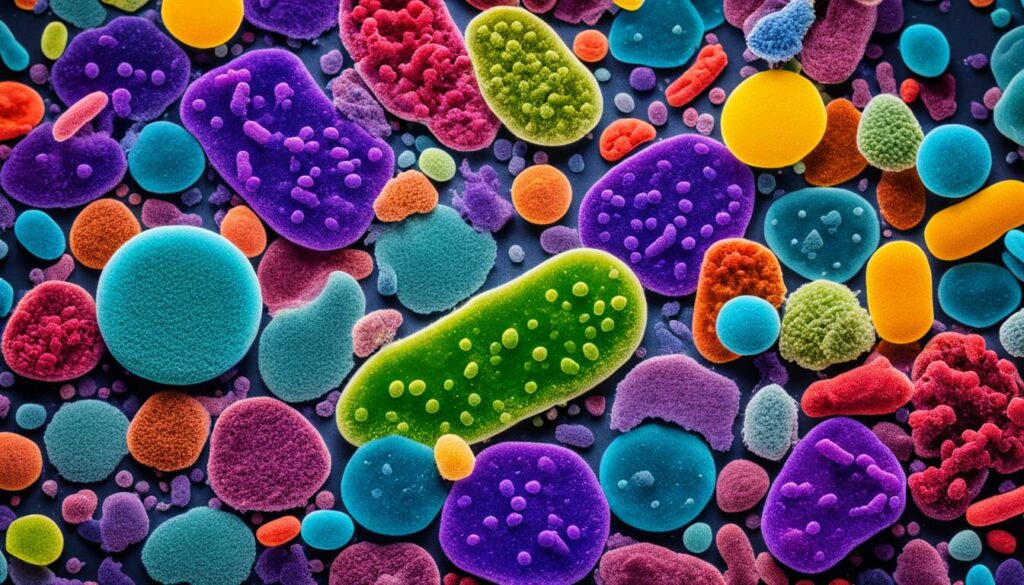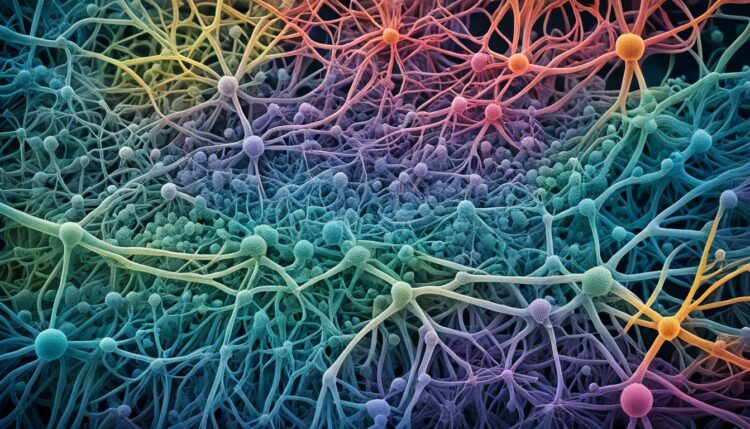Did you know that the trillions of microbes residing in your gut could have a profound impact on your personality?
Recent research conducted at Oxford University’s Department of Experimental Psychology has uncovered a fascinating link between the composition and diversity of gut bacteria, known as the gut microbiome, and various personality traits. This groundbreaking study sheds light on the role of gut microbes in shaping who we are.
Key Takeaways:
- The composition and diversity of gut bacteria, referred to as the gut microbiome, are strongly associated with multiple personality traits.
- Specific types of bacteria in the gut have been linked to variations in sociability, neuroticism, and other behavioral characteristics.
- Individuals with a more diverse gut microbiome tend to have larger social networks and better gut and general health.
- Factors such as diet, infant nutrition, and environmental exposure shape the gut microbiome and potentially influence personality traits.
- Promoting a healthy gut microbiome through diet and lifestyle choices may have positive implications for mental well-being.
The Link Between Gut Bacteria and Personality
Research conducted by Dr. Katerina Johnson at Oxford University has shed light on the fascinating connection between gut bacteria and personality traits.
In her study, Dr. Johnson found that specific types of bacteria in the gut were associated with differences in sociability and neuroticism, suggesting that our gut microbiome plays a role in shaping our behavior and psychological characteristics.
Previous research has also shown a link between gut microbes and social behavior, as well as conditions like autism. These findings further support the idea that the composition of our gut microbiome can influence our personality and overall well-being.
“The gut-brain axis provides a direct line of communication between our gut and brain,” explains Dr. Johnson. “This means that the microbes living in our gut have the ability to influence our mood, behavior, and even cognition.”
This research highlights the importance of understanding and nurturing our gut microbiome for maintaining a healthy and balanced mind-body connection. By taking care of our gut health, we may be able to positively influence our personality traits and enhance our overall psychological well-being.
To visualize the connection between gut bacteria and personality, refer to the table below:
| Personality Trait | Associated Gut Bacteria |
|---|---|
| Sociability | Bacteroides fragilis |
| Neuroticism | Eubacterium eligens |
| Anxiety | Prevotella copri |
| Aggression | Firmicutes |
How Gut Microbes Influence Personality
The connection between gut bacteria and personality can be attributed to the gut-brain axis. This bidirectional communication pathway allows signals to flow between the gut and the brain, influencing our emotions, behavior, and cognition.
The gut microbiome produces molecules, such as neurotransmitters and short-chain fatty acids, that can directly impact brain function and behavior. These molecules can influence the production of hormones, regulate inflammation, and modulate neural pathways associated with mood and personality traits.

Furthermore, gut bacteria play a vital role in the production and regulation of serotonin, a neurotransmitter that plays a crucial role in mood and well-being.
Serotonin imbalance has been linked to various psychological disorders, including depression and anxiety. By modulating serotonin levels, gut microbes can potentially influence our psychological traits and overall personality.
The Role of Gut Microbiota Diversity in Personality
The research conducted by Dr. Johnson has revealed a fascinating connection between the diversity of gut microbiota and personality traits. It was found that individuals with a more diverse gut microbiome tend to have larger social networks and enjoy better gut and overall health.
This suggests that maintaining a diverse gut microbiota through healthy eating habits and social interactions may have a positive impact on personality traits, such as sociability and overall well-being.
In contrast, higher levels of stress and anxiety were associated with lower gut microbiome diversity. This highlights the intricate relationship between gut health and personality, as well as the potential role of the gut microbiota in influencing behavior.
Studies have shown that the composition and diversity of gut bacteria can significantly impact various aspects of human health and well-being beyond just digestion. The gut microbiota is increasingly recognized as a key contributor to the gut-brain axis, a bidirectional communication pathway between the gut and the brain.
When the balance of gut bacteria is disrupted, it can lead to alterations in neurotransmitter production, inflammation, and immune system function, all of which can affect mood, cognition, and behavior.
In fact, emerging research suggests that gut microbiota may play a role in the development of mental health conditions, such as depression and anxiety.
To illustrate the importance of gut microbiota diversity in personality, consider the following:
Research has consistently shown that the gut microbiota of individuals with a larger social network is more diverse compared to those with smaller social networks. This suggests that maintaining a diverse gut microbiome may facilitate social interactions and enhance sociability.
Moreover, individuals with a healthier gut microbiota often exhibit improved overall well-being, including reduced stress and enhanced resilience. This further supports the notion that a diverse gut microbiome can positively impact personality traits and behavior.
By understanding and nurturing the diversity of our gut microbiota, we may be able to optimize our mental and emotional well-being. This includes incorporating a balanced and varied diet rich in fiber, whole grains, fruits, and vegetables, which act as sources of prebiotics for gut bacteria.
Additionally, engaging in regular exercise, managing stress levels, and fostering meaningful social connections can also contribute to a healthier gut and, potentially, a more vibrant personality.
Key Insights
- Individuals with a more diverse gut microbiota tend to have larger social networks and better overall health.
- Maintaining a diverse gut microbiome through healthy eating habits and social interactions may positively impact personality traits.
- Higher levels of stress and anxiety are associated with lower gut microbiome diversity.
- Gut microbiota plays a vital role in the gut-brain axis, influencing mood, cognition, and behavior.
- Gut microbiota diversity may contribute to the development of mental health conditions, such as depression and anxiety.
Factors Influencing Gut Microbiota and Personality
The composition and diversity of the gut microbiome, which refers to the community of microorganisms living in our intestines, are significantly influenced by various factors. These factors include infant nutrition, diet, and exposure to different environments.
Research has shown that these factors play a crucial role in shaping the gut microbiota and, in turn, may influence personality traits.
One such factor is infant nutrition. Studies have found that individuals who were formula-fed as infants tend to have a less diverse microbiome compared to those who were breastfed.
Breast milk contains essential nutrients and prebiotics, which promote the growth of beneficial bacteria in the gut. This early exposure to beneficial bacteria contributes to a healthier and more diverse gut microbiota, which may have long-term effects on personality.
The influence of diet on gut microbiome composition and diversity is also well-documented. Consuming a diet high in natural sources of probiotics and prebiotics, such as yogurt, kefir, sauerkraut, and whole grains, can promote the growth of beneficial gut bacteria.
These bacteria help maintain a healthy gut microbiome diversity, potentially influencing personality traits. Conversely, a diet lacking in these nutrients may lead to imbalances in the gut microbiota and impact overall well-being and behavior.
Furthermore, exposure to different environments can have a significant impact on gut bacteria and behavior. Studies have shown that individuals living in rural or less urbanized areas tend to have a more diverse gut microbiome compared to those in highly urbanized settings.
This difference may be attributed to differences in diet, lifestyle, and exposure to various microorganisms found in different environments.
In summary, factors such as infant nutrition, diet, and exposure to diverse environments play a crucial role in shaping the composition and diversity of the gut microbiome.
Maintaining a healthy and diverse gut microbiota through proper infant nutrition, a balanced diet, and exposure to different environments may have a positive impact on personality traits and overall well-being.

The Potential Implications for Mental Health
The gut microbiome, composed of trillions of bacteria residing in our gastrointestinal tract, has been linked to numerous aspects of our health, including mental well-being and psychological traits. The connection between gut microbes and personality has garnered significant attention, shedding light on the role of gut bacteria in mental health.
A study conducted at Oxford University revealed that individuals who consumed more foods rich in naturally occurring probiotics and prebiotics had lower levels of anxiety, stress, and neuroticism. This suggests that the gut microbiome plays a crucial role in influencing psychological traits and overall mental well-being.
“A healthy gut microbiome obtained through diet and lifestyle choices may have a positive impact on mental health.”
By promoting a diverse and balanced gut microbiome, individuals may enhance mental resilience and reduce the risk of conditions such as autism and depression. The gut-brain axis, the bidirectional communication system between the gut and the brain, is believed to be a key player in this complex relationship.
A healthy gut microbiome can contribute to the production of neurotransmitters, regulate inflammation, and modulate the stress response, all of which are essential for maintaining mental health.
Therefore, nurturing a thriving gut microbiota through diet and other lifestyle factors may potentially inform the development of new therapeutic interventions for mental health disorders.
Further research is needed to better understand the specific mechanisms by which gut bacteria influence mental well-being and to explore the potential benefits of targeted interventions.
Nonetheless, the emerging evidence highlighting the role of the gut microbiome in mental health underscores the importance of maintaining a healthy gut through mindful dietary choices and lifestyle habits.
Conclusion
The research conducted at Oxford University provides compelling evidence for a strong relationship between the gut microbiome and personality traits.
The composition and diversity of gut bacteria appear to play a significant role in shaping individual differences in behavior, sociability, and psychological traits. This supports the notion of a gut-brain axis and highlights the influence of gut microbes on personality.
While further research is needed to better understand the specific mechanisms involved, these findings emphasize the importance of maintaining a healthy gut microbiome through diet and lifestyle choices.
A diverse and balanced gut microbiota may have a positive impact on sociability, overall well-being, and potentially even mental health.
The implications of this research are wide-ranging, and the potential therapeutic applications are promising. By focusing on promoting a healthy gut microbiome, individuals may have the opportunity to enhance their personality traits and potentially improve their overall quality of life.
Future studies in this field will help to uncover the intricate connections between the gut microbiome and personality, paving the way for innovative approaches to personalized medicine and mental health interventions.
FAQ
Do gut microbes control your personality?
Recent research suggests that there is a strong relationship between the composition and diversity of gut bacteria (the gut microbiome) and various personality traits.
How does the gut microbiome influence personality?
The gut microbiome appears to play a significant role in shaping individual differences in behavior, sociability, and psychological traits.
What is the role of gut microbiota diversity in personality?
Maintaining a diverse gut microbiota through healthy eating habits and social interactions may have a positive impact on personality traits such as sociability and overall well-being.
What factors influence the gut microbiota and personality?
Factors such as infant nutrition, diet, and exposure to different environments play a significant role in shaping the composition and diversity of the gut microbiome.
Can the gut microbiome affect mental health?
There is evidence to suggest that promoting a healthy gut microbiome through diet and lifestyle choices may be beneficial for mental well-being and may potentially inform the development of new therapies for conditions such as autism and depression.
What does the research say about the link between gut bacteria and personality?
The research conducted at Oxford University provides compelling evidence for a strong relationship between the gut microbiome and personality traits.
What are the potential implications of the gut microbiome for mental health?
The gut microbiome may have implications for mental health, and promoting a healthy gut microbiome through diet and lifestyle choices may be beneficial for mental well-being.
What can I do to maintain a healthy gut microbiome?
Maintaining a diverse gut microbiota through healthy eating habits, including foods with naturally occurring probiotics and prebiotics, and engaging in social interactions can help maintain a balanced gut microbiota and potentially influence personality traits.




